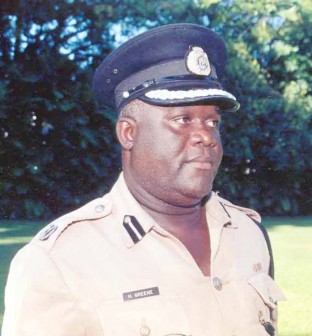Lawyers for Commissioner of Police Henry Greene have secured an order barring the police from instituting a rape charge against him, Crime Chief Seelall Persaud said this afternoon.
During a telephone interview, Persaud said that he had just received an order from the High Court preventing the police from instituting charges until “a challenge to the DPP’s advice is heard.”
He said that the case is scheduled to be heard on February 20.
Persaud this morning confirmed that the Director of Public Prosecutions has advised that police commissioner Henry Greene be charged with rape.
Persaud however could not say when the charge would be instituted and when Greene could make his first court appearance.
“I don’t know if he is going to court today but if that is so I ought to have known”, he stressed.

In December a mother of two alleged that the top cop raped her at a city hotel after she sought his assistance in getting back her cell phone.
A team of Jamaican investigators travelled to Guyana to assist in the probe and took several statements from the woman and Greene.
That file was sent to the DPP twice.
Greene is currently on leave pending the outcome of the investigation. Assistant commissioner Leroy Brummell is now in charge of the force.
Home Affairs Minister Clement Rohee last week told this newspaper that Greene’s return hinges on the DPP advice.
Now that the DPP has advised that a charge of rape be brought, Greene is likely to face disciplinary proceedings under the constitution which could lead to his removal from office.
Last month, Attorney General Anil Nandlall had said that given the nature of the allegations against Greene, there must be a recommendation from the DPP to charge him before there is any constitutional sanction.
Nandlall’s comments had come in the wake of criticisms that action against Greene under the constitution had not been proceeded with by the government.
Speaking to Stabroek News, Nandlall said that the nature of the allegations would be one of the considerations that would see criminal charges being brought prior to an application of the provisions of Article 225 of the Constitution. “There must be some type of investigation before you activate Article 225,” said Nandlall. “Because it was a criminal matter the police were activated,” he explained.
Stabroek News, in an editorial on January 9th, had said that serious allegations against Greene should trigger Article 225, which caters for a tribunal to be appointed. “…it can determine the matter. This would have required either the Prime Minister or the Chairman of the Police Service Commission referring this issue to the President followed by a tribunal,” the editorial said.
However, Nandlall said that it was hasty for this newspaper to suggest that the constitutional action could be triggered on the basis of a mere allegation. He said that Article 225 is draconian in its effect and ought only to be activated upon sure foundations, as the persons who are affected by it are high constitutional office holders, whose offices enjoy security of tenure under the constitution.
According to Nandlall, in a letter to the media dated January 13, 2012, Article 225 essentially sets out the grounds upon which certain constitutional office holders, including the Commissioner of Police, can be removed from office, by whom they can be removed and the procedure which must be followed for their proper and lawful removal. He said that the grounds for removal of such an office holder as stated in the Article are the inability to discharge the function of the office, whether arising from infirmity of body or mind or any other cause whatsoever, or for misbehaviour. Having regard to the nature of the allegations against the Commissioner, he said it is “excruciatingly plain” that for the purpose of the Article, the applicable ground would be misbehaviour. But, he added, that to adhere to the principles of fairness, natural justice and the constitutional guarantee of the presumption of innocence, an investigation was necessary to determine whether or not there is a basis for the allegation.
“It is only when there is a finding of sufficient evidence of alleged misbehaviour by the investigations, that the question of removal from office arises in order to catalyse Article 225 into operation,” he said.





